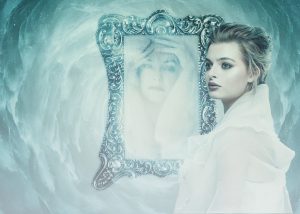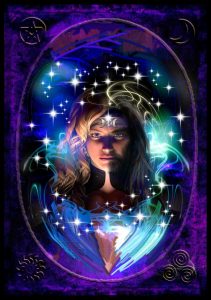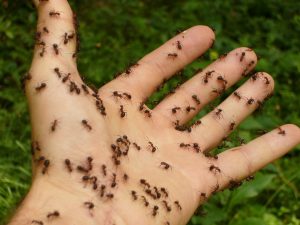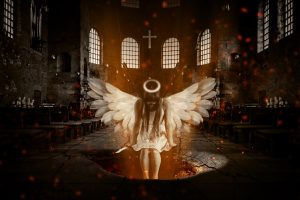
At the end of my previous article, I referred to this story as one in which the main character is a woman, which is unusual for an ancient myth, and said that I would return to it. It is found in books IV-VI of a novel by Apuleius called the Metamorphoses, also known as The Golden Ass, which is the story of the travels of Lucius. The title suggests that the story is about inner transformation. He is a would-be magician (in the ancient sense), and while trying to perform a spell to transform himself into a bird, he is accidentally turned into an ass. This allegory is not hard to unravel — he wants to become a bird (be united with his soul), but instead becomes an ass (an idiot, therefore one in need of spiritual education). He then sets out on a long journey, the journey of the soul, and eventually finds salvation from the goddess Isis.
The novel contains several other stories told to Lucius by people he meets, one of which is this tale of Eros and Psyche. A lengthy analysis of it is provided by the Jungian writer Erich Neumann in Amor and Psyche: The Psychic Development of the Feminine (1). The plot is very complicated — about 50 pages — and Neumann’s analysis takes up more than 100 pages, so I will focus only on the main details, my intention being merely to make readers aware of the existence of this story, if you do not know it already. Please do further research if you find what follows interesting.
Plot Summary
The traditional fairy-tale role of the malevolent witch is played by the goddess Venus, who is jealous that Psyche is so beautiful that she is worshipped by mortals in a way that she thinks is appropriate only to her, and therefore sets out to punish her.

Psyche is extraordinarily beautiful, yet is unable to find a husband. This is because “men marveled at her divine loveliness, but as men marvel at a statue fairly wrought”. I take this to mean that men were so intoxicated by her beauty, that they were unable to appreciate the real living woman, who remained hidden or latent, under the skin. This led Psyche to loath “the loveliness that had charmed so many nations”. Her father is very unhappy about this situation, and decides to consult an oracle. Its response is one that might outrage feminists who complain about misogyny and violence to women in fairy tales. It says that she cannot have a mortal husband, but will have rather a supernatural figure who is “fierce and wild”, whom even Jove, king of the gods, fears, but that for their wedding she should be “in all the pomp of funeral robes arrayed” and set forth “on some high crag”. The implication is that this will be a human sacrifice, “her ghastly bridal”. Psyche is going to die, and the whole town goes to her ‘wedding’ in the manner of a funeral train.
In spiritual language, however, ‘death’ means the death of the ego, or the personality, and is the prelude to rebirth. Psyche herself has a very different attitude as she addresses her parents: “When nations and peoples gave me divine honour, when with one voice they hailed me as a new Venus, then was the time for you to grieve, to weep and mourn me as one dead. Now I perceive, now my eyes are opened. … I hasten to meet that blest union, I hasten to behold the noble husband that awaits me”. This is an ancient version of the feminist complaint against the Miss World competition, in which women are judged purely by their looks, not for what they truly are. Psyche does not want to be treated as a sex-object and recognises that her death/sacrifice is the beginning of a search for her true self. Rather, it is her willingness to sacrifice herself that is important. As it turns out, in true fairy-tale fashion, while awaiting her fate on the crag, she is rescued by a “soft air from the breathing West… (which) raised her and… let her fall gently down and laid her on the flowery sward in the bosom of a deep vale”. Significantly at this point, she falls asleep (more allegory). She awakes to find herself in “a grove of huge and lofty trees… (with) a transparent fountain of glassy water… (and) a palace built by no human hands but by the cunning of a god”. It is clear that she has been transported, like Alice to Wonderland and Dorothy to Oz, to the world of faerie.

In the language of dreams a house represents the personality, the various rooms signifying the various aspects. Thus common themes, when a person is on a voyage of self-discovery, are “I found myself in a large house…”, “there were many rooms I did not know about before”, and so on. So too Psyche discovers and explores this house/palace where she finds “a lofty chamber piled high with countless treasure” and “there was no chain nor bar nor sentinel to guard the treasure of all the world”. A disembodied voice tells her that “all is yours”. She must indeed have an extraordinary (divine!) personality!

Her new husband, the owner of this palace, is not the deathly figure the oracle predicted. It is the god Eros, although Psyche does not know this. He comes to her in the darkness of night, and she is addressed by him, but “she saw not her unknown spouse”.
Psyche has two wicked sisters who plot against her “even to devise her death”. Eros warns her about this in strong terms, tells her to ignore them, not to speak to them at all, their purpose being “to persuade you to seek to know my face which, as I have told you, if once you see, you will see no more”. If she does what he says, she will give birth to a divine child.
Psyche is somewhat weak-willed on this, and asks to be allowed to meet her sisters, which happens. They manage to figure out what is going on, and devise a plot. They tell Psyche, reminding her of the oracle, that the husband she cannot see is actually a huge poisonous serpent who will devour her and her unborn child. Psyche at this point is “a simple and gentle soul”, and she forgets her husband’s warnings and her promises to him, agreeing with the sisters that she has never seen her husband’s face, and does not know where he comes from.
They persuade her that she should decapitate the serpent during the night. Psyche attempts to do this, but then discovers, when she lights her lamp, that her husband is actually the god Eros (called Amor in the text). She has been tricked into breaking her promise not to seek to know his identity, and he therefore “flew away with never a word”. Psyche, however, catches hold of his leg, clings to him as he flies through the clouds, but eventually “overwearied she fell to earth”. Eros admonishes her, then punishes her by flying away and leaving her.
Psyche begins a desperate search, hoping to find her husband again. Venus, still insanely jealous and seeking to punish her, eventually sets her what she thinks are four impossible tasks, the purpose of which, in her eyes, is to demonstrate that Psyche is not Eros’s legitimate bride. She is not offering her a reward if she successfully completes them.
The first is to sort out and separate a jumbled and confused heap of corn, barley, millet, poppy seeds, chick peas, lentils and beans, a task which has to be completed by evening. This would be impossible were she not helped by a host of ants who rushed to help her.

The second task is to take a wisp of golden wool from a flock of sheep. Psyche at this point is so overcome by her woes that she intends to commit suicide by throwing herself off a cliff into a river. A reed from the river, however, asks her “not to pollute my sacred waters by slaying thyself thus miserably”. It reveals that these creatures are far worse than what we would normally understand by sheep — they have “sharp horns and foreheads hard as stone”, they can be maddened into a wild frenzy by the “fierce heat from the blazing sun” and “with venomous bites, they vent their fury in the destruction of men”; they sound more like mad rams. Furthermore, the reed offers an ingenious solution to the problem of obtaining the golden wool. Psyche follows the instructions and takes some back to Venus.

For the third task she has to draw icy water from the top of a high mountain into an urn and bring it back to Venus. The climb is extraordinarily difficult — “it was a rock of measureless height, rough, slippery, and inaccessible”. If that is not bad enough, there are fierce dragons in crannies in the crag, and the waters have voices that tell her that she is doomed to die. She “felt herself turned to stone by the impossibility of her task”, but is helped out by an eagle, “the royal bird of highest Jove”, which Neumann accurately describes as a deus ex machina, who takes the urn to the summit and obtains the water. Venus is not impressed that Psyche has successfully completed the three tasks, is “frenzied”, and threatens her with worse torments.

For the fourth task, Psyche is to take a casket and descend to the underworld, where she has to ask Proserpine for a small portion of her beauty. Psyche is overwhelmed by the immensity of the task, and again contemplates suicide by throwing herself from a high tower. The tower itself intervenes, telling her this would be the wrong path, since, if she kills herself and enters the underworld as a dead person, she will never be able to return. She must enter the underworld as a living person, and the tower instructs her in what she needs to do to reach Proserpine. The most important instruction seems to be to take whatever is given to her, but not to open or look within the casket, thus not to allow her curiosity to “view the treasure of divine beauty that is concealed within”.

She carries out the tower’s other lengthy instructions to the letter but, given what we know from similar myths (e.g. Orpheus and Eurydice), we should not be surprised when curiosity gets the better of her, and she disobeys the most important one, opens the casket, and discovers no beauty “nor anything at all save a hellish and truly Stygian sleep which… rushed upon her and poured over all her limbs in a thick cloud of slumber”. She becomes “no better than a sleeping corpse”.
Eros now longs to be reunited with his beloved Psyche, so finds her, returns the sleep to the casket, wakes her, and urges her to perform the task with which she was charged, saying cryptically that he will see to the rest. Eros enlists the help of and makes a deal with Jove, who explains to Venus that she has nothing to fear from Psyche, whom he instructs Mercury to bring up to heaven, where he confers immortality upon her, and an elaborate wedding ceremony follows.

This story is interpreted in the following article (click on for link).
====================================================================================================
Footnote:
(1) Princeton University Press, 1971